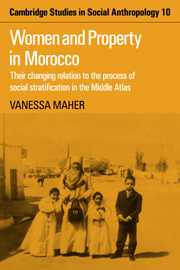 Women and Property in Morocco
Women and Property in Morocco Children who, as a result of misfortune or design, come to live with people other than their parents, are frequently fostered by their mother's female relatives. This is especially true of girls fostered in crisis and constitutes one more indication of the structural importance of uterine kinship, which acts as a safety net for the casualties of a discriminatory social system which tends to work to the advantage of men, though favouring some men more than others.
The arrangement which places children with their mother's kin also avoids the conflicts over inheritance which might break out if a child were fostered by an agnate. Such conflicts might be of two forms, those between the rightful heirs of a man and his foster-child agnate, or those between a person fostered in crisis and his agnateguardian who might attempt to steal his inheritance. Both these situations might arise in fostering but the threat to kinship rights would be greater if adoption were possible.
In this chapter I discuss the meaning of fostering and the prohibition on adoption, the reasons why children are fostered, and their distribution among kin and others.
The importance of the category ‘others’ leads me to deal with the social situation of foster-children. The foster-child's disadvantages complement the need of many women to improve their position in the women's status-system by acquiring ‘false kin’ and clients, among whom are children.
To save this book to your Kindle, first ensure no-reply@cambridge.org is added to your Approved Personal Document E-mail List under your Personal Document Settings on the Manage Your Content and Devices page of your Amazon account. Then enter the ‘name’ part of your Kindle email address below. Find out more about saving to your Kindle.
Note you can select to save to either the @free.kindle.com or @kindle.com variations. ‘@free.kindle.com’ emails are free but can only be saved to your device when it is connected to wi-fi. ‘@kindle.com’ emails can be delivered even when you are not connected to wi-fi, but note that service fees apply.
Find out more about the Kindle Personal Document Service.
To save content items to your account, please confirm that you agree to abide by our usage policies. If this is the first time you use this feature, you will be asked to authorise Cambridge Core to connect with your account. Find out more about saving content to Dropbox.
To save content items to your account, please confirm that you agree to abide by our usage policies. If this is the first time you use this feature, you will be asked to authorise Cambridge Core to connect with your account. Find out more about saving content to Google Drive.